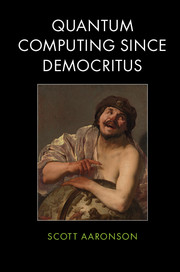Book contents
- Frontmatter
- Dedication
- Contents
- Preface
- Acknowledgments
- 1 Atoms and the void
- 2 Sets
- 3 Gödel, Turing, and friends
- 4 Minds and machines
- 5 Paleocomplexity
- 6 P, NP, and friends
- 7 Randomness
- 8 Crypto
- 9 Quantum
- 10 Quantum computing
- 11 Penrose
- 12 Decoherence and hidden variables
- 13 Proofs
- 14 How big are quantum states?
- 15 Skepticism of quantum computing
- 16 Learning
- 17 Interactive proofs, circuit lower bounds, and more
- 18 Fun with the Anthropic Principle1
- 19 Free will
- 20 Time travel
- 21 Cosmology and complexity
- 22 Ask me anything
- Index
11 - Penrose
Published online by Cambridge University Press: 05 April 2013
- Frontmatter
- Dedication
- Contents
- Preface
- Acknowledgments
- 1 Atoms and the void
- 2 Sets
- 3 Gödel, Turing, and friends
- 4 Minds and machines
- 5 Paleocomplexity
- 6 P, NP, and friends
- 7 Randomness
- 8 Crypto
- 9 Quantum
- 10 Quantum computing
- 11 Penrose
- 12 Decoherence and hidden variables
- 13 Proofs
- 14 How big are quantum states?
- 15 Skepticism of quantum computing
- 16 Learning
- 17 Interactive proofs, circuit lower bounds, and more
- 18 Fun with the Anthropic Principle1
- 19 Free will
- 20 Time travel
- 21 Cosmology and complexity
- 22 Ask me anything
- Index
Summary
This chapter is about Roger Penrose's arguments against the possibility of artificial intelligence, as famously set out in his books The Emperor's New Mind and Shadows of the Mind. It would be strange for a book like this one not to discuss these arguments, since, agree with them or not, they're some of the most prominent landmarks at the intersection of math, CS, physics, and philosophy. The reason we're discussing them now is that we finally have all the prerequisites (computability, complexity, quantum mechanics, and quantum computing).
Penrose's views are complicated: they involve speculations about an “objective collapse” of quantum states, which would arise from an as-yet-undiscovered quantum theory of gravity. Even more controversially, this hypothesized objective collapse would play a role in human intelligence, through its influence on cellular structures called microtubules in the brain.
But what is it that leads Penrose to make these exotic speculations in the first place? The core of Penrose’s thesis is a certain argument purporting to show that human intelligence can’t be algorithmic, for reasons related to Gödel’s Incompleteness Theorem. And therefore, some nonalgorithmic element must be sought in human brain function, and the only plausible source of such an element is new physics (coming, for example, from quantum gravity). The “Gödel argument” itself didn’t originate with Penrose: Gödel himself apparently believed some version of it (though he never published his views), and even in 1950 it was well enough known for Alan Turing to rebut it in his famous paper “Computing machinery and intelligence.” Probably the first detailed presentation of the Gödel argument in print came in 1961, from the philosopher John Lucas. Penrose’s main innovation is that he takes the argument seriously enough to explore, at length, what the universe and our brains would actually need to be like – or better, what they could possibly be like – if the argument were valid. Hence, all the stuff about quantum gravity and microtubules.
- Type
- Chapter
- Information
- Quantum Computing since Democritus , pp. 150 - 159Publisher: Cambridge University PressPrint publication year: 2013



